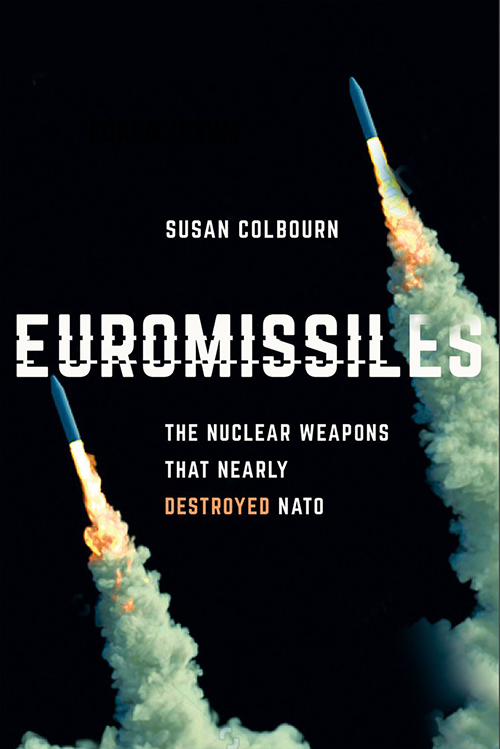Susan Colbourn hopes to share some history lessons with a younger generation who have not had to concern themselves with the nightmarish fear of nuclear war, something that haunted their parents and grandparents.
The Arts & Science alum and author of the newly released book, Euromissiles — The Nuclear Weapons That Nearly Destroyed NATO, Colbourn says the war in Ukraine is exposing a new generation to the threat of Armageddon that defined the 1980s.
“A lot of people have started to worry again about what the Russians might do with their nuclear arsenal, and I really feel like the book can speak to these contemporary conversations,” says Colbourn, associate director of the Program in American Grand Strategy at Duke University.
“It is important that we know how and why the Cold War ended, and make it accessible to a new generation who hadn't lived through this,” adds Colbourn, who earned an honours bachelor of arts as a member of Trinity College in 2009 and a PhD in history in 2018 at U of T.
The Cold War featured a standoff between NATO nations, led by the U.S., and the Warsaw Pact, led by the Soviet Union. But the buildup of Euromissiles — intermediate-range nuclear weapons intended for European battlefields — sent thousands into the streets to protest, even as the NATO bulwark struggled with weaknesses in the alliance.
“So much of the Cold War operated on threatened nuclear war, in the hopes that it would never come. But that was uncomfortable for a lot of people when they really thought about what that meant,” she says.
“That's a place where the book is certainly relevant, just watching our own times. Many more people, particularly younger people, realize what a world with nuclear weapons actually means.”
NATO’s current revival is thanks in large part to Russian leader Vladimir Putin’s miscalculations and threats the conflict with Ukraine will escalate across Europe.
“Putin has once again provided the best case for NATO's continuation.”
Prior to arriving at Duke University, Colbourn held fellowships at Yale University’s International Security Studies program and at Johns Hopkins School of Advanced International Studies. She is currently a senior fellow at the Bill Graham Centre for Contemporary International History, located at Trinity College.
There's just a remarkable community around U of T, and it’s a special place because it has such a unique environment. The college system, particularly at the undergraduate level, is such a forge. I wouldn't be who I am today if it weren't for the time I spent there.
She says her courses and professors at U of T were key in convincing her to pursue a career as a diplomatic historian, which is why she returned to Toronto for her PhD after completing a master of arts at the London School of Economics.
In particular, she credits undergraduate seminars with renowned historians such as Robert Bothwell, Arne Kislenko, Margaret MacMillan and Denis Smyth.
“Bothwell, Kislenko, and MacMillan encouraged an academic interest that helped guide much of my undergraduate career and Smyth was exactly the instructor I needed as my undergraduate career wrapped up,” says Colbourn, who benefitted from undergraduate bursaries at Trinity College and PhD funding made possible by donors, such as the Jeanne Armour Graduate Scholarship in Canadian History from 2014 to 2017.
She fondly recalls being a teaching assistant for Bothwell’s Canadian Foreign Relations survey classes. “Those classes were always legendary at U of T and a lot of fun.”
Even though she’s now in the U.S., she feels fortunate to be part of a U of T diaspora through the Graham Centre, as well as the network of alumni she’s encountered.
“One thing I didn’t appreciate until after I left is the number of people who I would meet and befriend who went to U of T,” says Colbourn.
“U of T has trained an incredible number of diplomatic historians, and I go to professional conferences, and find people with that Toronto connection. We swap stories about classes we took and old professors who we still keep in touch with.”
That feeling of U of T community extends to her own family. Her father Charles Joseph Colbourn (BSc Trinity College, 1976 and PhD in Computer Science, 1980) and sister Sarah Matilda Colbourn (Hons. BA, St. Michael’s College, 2020) are also U of T graduates. Susan Colbourn met her husband Simon Miles (Hons. BA, 2010) — now also a diplomatic historian at Duke University — while they were undergraduates at Trinity.
“There's just a remarkable community around U of T, and it’s a special place because it has such a unique environment. The college system, particularly at the undergraduate level, is such a forge,” she says.
“I wouldn't be who I am today if it weren't for the time I spent there.”


